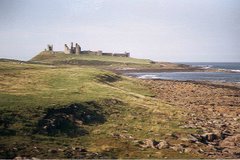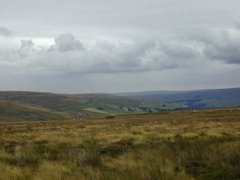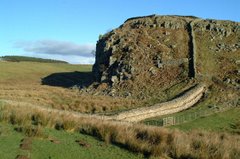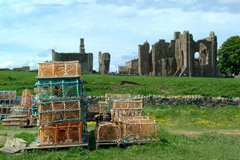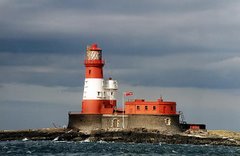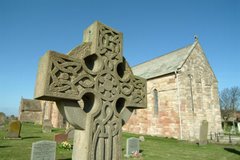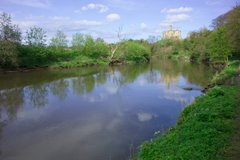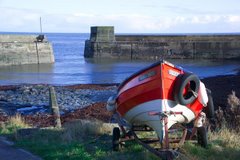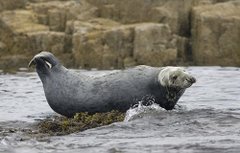Amble
Amble is a town in Northumberland, England. It is a seaport on the North Sea coast. It lies at the mouth of the River Coquet.
Amble grew in the nineteenth century as collieries were opened; its location at the mouth of the River Coquet, and its then newly built railway links to the Northumberland coalfields, made it an ideal centre for the transportation and export of coal. Other industries, such as ship building and repair, and sea fishing, expanded with the growth of the town, although traditional Northumbrian fishing vessels such as cobles will have sheltered in the natural harbour here for centuries previously.
Today, the collieries in Northumberland are all closed (the last, Ellington, closed in 2005), and the railway no longer serves Amble. However, the fishing industry survives, albeit with a somewhat reduced numbers of vessels, as does a small marine industry, mainly concentrated around the construction and repair of yachts and other pleasure craft. A small industrial estate is located to the southwest of the town, whose clients include food processing plants, vehicle repairs and telecommunications companies.
Tourism forms an important sector of the town's economy - part of the harbour has been redeveloped into a marina, and several caravan parks, guest houses and B&Bs exist to serve visitors to the Northumberland coast.
Saint Cuthbert lived on Coquet Island just offshore from the town,which retains its strong Christian identity. Amble's four churches are often quite busy, especially at Christmas eve-although the impact of liberalisation of licensing laws on Midnight Mass remains to be seen. Nearby Warkworth is noted for its castle.
Amble holds the title 'Friendliest Port'. It is believed this title comes from the 1930s when the RMS Mauretania was heading on her last voyage to the breaker's yard at Rosyth and stopped for the last time in Amble. Amble catered for the men of the ship and gave them food and shelter, as they parted they said that Amble was ' the last and friendliest port of England.
Article adapted from the Wikipedia online encyclopedia.
Amble grew in the nineteenth century as collieries were opened; its location at the mouth of the River Coquet, and its then newly built railway links to the Northumberland coalfields, made it an ideal centre for the transportation and export of coal. Other industries, such as ship building and repair, and sea fishing, expanded with the growth of the town, although traditional Northumbrian fishing vessels such as cobles will have sheltered in the natural harbour here for centuries previously.
Today, the collieries in Northumberland are all closed (the last, Ellington, closed in 2005), and the railway no longer serves Amble. However, the fishing industry survives, albeit with a somewhat reduced numbers of vessels, as does a small marine industry, mainly concentrated around the construction and repair of yachts and other pleasure craft. A small industrial estate is located to the southwest of the town, whose clients include food processing plants, vehicle repairs and telecommunications companies.
Tourism forms an important sector of the town's economy - part of the harbour has been redeveloped into a marina, and several caravan parks, guest houses and B&Bs exist to serve visitors to the Northumberland coast.
Saint Cuthbert lived on Coquet Island just offshore from the town,which retains its strong Christian identity. Amble's four churches are often quite busy, especially at Christmas eve-although the impact of liberalisation of licensing laws on Midnight Mass remains to be seen. Nearby Warkworth is noted for its castle.
Amble holds the title 'Friendliest Port'. It is believed this title comes from the 1930s when the RMS Mauretania was heading on her last voyage to the breaker's yard at Rosyth and stopped for the last time in Amble. Amble catered for the men of the ship and gave them food and shelter, as they parted they said that Amble was ' the last and friendliest port of England.
Article adapted from the Wikipedia online encyclopedia.
How to get to Alnmouth:
By road: Take the main A1 trunk road north from Newcastle upon Tyne, to Alnwick. Take the Alnwick exit and follow the road towards Alnwick town centre. From the town centre take the A1068 coastal route. Amble is about 8 miles south east of Alnwick.
By rail: The nearest station is Alnmouth.
By bus: Arriva Northumbria service 518 goes from the Haymarket Bus Station in Newcastle via Morpeth to Amble. In the reverse direction, the 518 goes from Alnwick via the coast to Amble. During the summer months the Coastal Clipper service runs between Bamburgh and Amble.
Map of area: CLICK HERE

